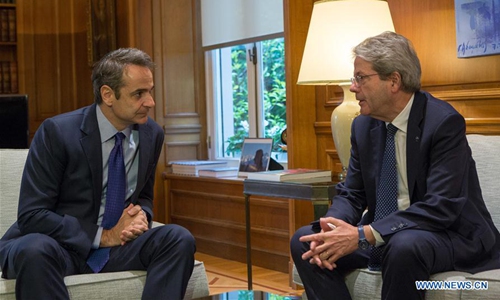The European Commission supports the launch of a discussion regarding the reduction of Greece’s primary surplus targets, provided that the country will keep the momentum of reforms, European Commissioner for Economy Paolo Gentiloni said on Thursday during a visit to Athens.
Gentiloni is on a two-day visit to the Greek capital as part of his tour across European capitals in the context of the EU’s regular schedule of coordination among member states on economic policy.
Welcoming Gentiloni, Greek Prime Minister Kyriakos Mitsotakis talked about the issue before the camera of national broadcaster ERT.
Greece exited the bailout era in 2018, but is still committed to meeting targets set in cooperation with its international creditors.
The goal for a 3.5 percent primary surplus target until 2022 was deemed necessary for the sustainability of the high Greek debt load, but Greek officials now argue that after achieving larger growth rates, the issue of ensuring debt sustainability through high primary surplus targets should be reviewed.
The Greek government has stated clearly that it will stick to the fiscal targets for 2019 and 2020, Mitsotakis said.
“During the year, soon rather than later, we expect to start a discussion regarding the lowering of the primary surplus targets starting in 2021. I think this is something which is very reasonable and I am glad that you also recognize that we are ready to start having that discussion,” the Greek prime minister said.
“Yes, I think the Commission is surely supportive to open this discussion. The decision will be taken by the Eurogroup, but I think that provided that Greece is keeping this momentum in reforms – you have very positive economic data overall – and I think that with this momentum the discussion on these targets could be reopened and the Commission will support this,” Gentiloni said.
According to government sources, during the meeting the two sides discussed the positive developments of recent months in the fiscal area, reflected in the reception of Greek securities in international markets, the country’s credit ratings and historically low interest rates on Greek bonds.
“I am realistically optimistic that we will make it. We continue to realize the county’s commitments, but we do request the necessary fiscal space to implement growth-boosting policies, in particular in the direction of lowering taxes for households and businesses,” Finance Minister Christos Staikouras told a joint press conference after a separate meeting with the European Commissioner.
“Maintaining a strong reforms momentum is essential to keep building up confidence and to create the conditions for a strong sustainable recovery,” Gentiloni told media.
“It is legitimate to open the debate on this issue. I think that the results are there to show that there is space to re-discuss the targets that we have. I think that this should be a process, a rather gradual process. The first step is the fifth mission report that will come out at the end of February,” he said, asked to comment on Athens request for lower primary surplus targets as well as the use of European central bank profits’ from Greek bonds (ANFAs and SMPs) for investments.
In the past Eurogroup had decided for the use of these earnings for the repayment of part of the Greek national debt.
Greece asks for their use to investments that will support development and this way indirectly reduce the Greek debt load.
A decision on both matters could be taken in June, Gentiloni said.
Greek Prime Minister Kyriakos Mitsotakis (L) meets with European Commissioner for Economy Paolo Gentiloni in Athens, Greece, on Feb. 6, 2020. Gentiloni is on a two-day visit to the Greek capital as part of his tour across European capitals in the context of the EU’s regular schedule of coordination among member states on economic policy. (Xinhua/Marios Lolos)




